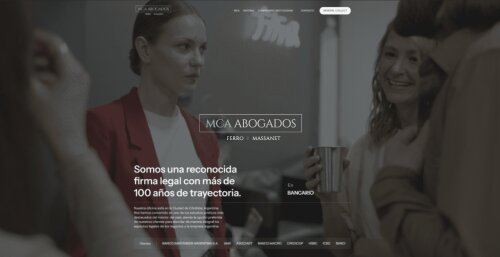Best Project Finance Lawyers in Córdoba
Share your needs with us, get contacted by law firms.
Free. Takes 2 min.
List of the best lawyers in Córdoba, Argentina
About Project Finance Law in Córdoba, Argentina
Project finance is a financing method that allocates credit and repayment largely to the cash flow of a specific project rather than to the balance sheets of its sponsors. In Córdoba, Argentina, project finance is used for infrastructure, energy, water and sanitation, mining, transport, industrial facilities and other capital-intensive ventures. Legal work focuses on structuring the project through a special purpose vehicle - SPV - preparing project agreements, negotiating finance documents, obtaining permits and securing the package of collateral and guarantees that lenders require.
Because Argentina is a federal country, project sponsors must navigate both national and provincial regimes. Projects in Córdoba will typically interact with provincial ministries, municipal authorities, and national regulators. Practically every project requires coordinated legal, environmental, tax and regulatory analysis under both levels of government.
Why You May Need a Lawyer
Project finance transactions are document-heavy and legally complex. You will likely need a lawyer if you are a sponsor, lender, investor, contractor, or public authority involved in any of the following situations:
• Preparing the project structure and forming an SPV to isolate project assets, liabilities and governance.
• Negotiating construction-engineering contracts (commonly EPC contracts), operation and maintenance agreements, off-take or concession agreements, supply and fuel contracts, and land use arrangements.
• Arranging project financing, including drafting and negotiating loan agreements, security instruments, intercreditor arrangements and guarantees.
• Responding to public procurement processes, tender documentation for public-private partnership - PPP - projects or concession bidding processes run by provincial or municipal authorities.
• Securing environmental approvals, permits and authorizations required at municipal, provincial and national levels.
• Managing labor and social security obligations, local content requirements and subcontractor arrangements during construction and operation.
• Structuring tax and customs aspects, negotiating tax stability measures or understanding incentives and subsidies that may affect project viability.
• Planning for risk allocation, including change-of-law, currency convertibility, force majeure and political risk, and negotiating dispute resolution mechanisms and enforcement strategies.
• Performing due diligence for acquisition, refinancing or investment transactions and preparing closing documentation.
Local Laws Overview
Federal and provincial law - Argentina has a dual legal framework. Federal laws and national regulators set standards in many sectors, but provinces like Córdoba have competence over land use, some environmental permits, provincial taxes and aspects of public contracting. Projects must satisfy both national and provincial requirements and often municipal rules as well.
Public procurement and PPPs - Project finance for public infrastructure frequently uses concession or PPP models. These are governed by specific procurement rules, tender procedures and concession contracts. Provincial tender documents set commercial and technical requirements, performance guarantees and default remedies.
Environmental and land-use regulation - Environmental impact assessments, remediation obligations and authorizations are commonly required. Córdoba has provincial environmental authorities with permitting regimes that work alongside national environmental regulations for certain sectors. Land titles, zoning and municipal permits are essential for construction and operation.
Security and enforcement - Typical security packages include mortgages over project land and assets, pledges over shares and bank accounts, assignment of receivables and fiduciary transfers where permitted. Enforcement of security interests must be planned in advance, considering local registry systems and judicial processes.
Tax and customs - Income tax, value-added tax - VAT - provincial taxes and municipal levies can materially affect project economics. Projects that involve importing equipment should assess customs duties and possible relief measures. Tax stability clauses or agreements with authorities may be negotiable in large projects.
Foreign investment and currency - Regulations on foreign investment, registration of foreign capital and foreign exchange controls can affect repatriation of profits, debt service in foreign currency and conversion of proceeds. Projects with foreign sponsors or lenders should evaluate current foreign exchange rules and possible hedging strategies.
Labor and social security - Argentine labor laws are protective and apply to employees engaged in construction and operations. Collective bargaining agreements, union relations and social security contributions are key cost and compliance items.
Dispute resolution - Contracts commonly provide for arbitration as the dispute resolution mechanism, often with an international or national arbitral seat. Local enforcement of arbitral awards should be assessed; parties also sometimes rely on local courts for interim relief or specialized judicial procedures.
Frequently Asked Questions
What is the typical project finance structure used in Córdoba?
Most projects use a special purpose vehicle - SPV - legally incorporated to hold project assets, contracts and permits. The SPV signs the EPC, O&M and off-take or concession agreements. Financing is extended to the SPV on a non-recourse or limited-recourse basis, and lenders take security over project assets, shares, accounts and contracts.
Who grants permits and concessions for projects in Córdoba?
Permits are granted by a mix of authorities. Municipalities grant local construction and zoning permits. The Province of Córdoba issues provincial environmental approvals, licenses and specific permits for regulated sectors. National authorities intervene in areas like energy, mining and transport depending on the sector and project scale.
How long does the permitting and approval process usually take?
Timelines vary widely by sector and project complexity. Simple municipal permits may take weeks to months. Environmental impact assessments and provincial approvals can take several months to a year or more. Large infrastructure concessions subject to public tender can extend over many months between prequalification and financial close.
What kinds of security interests are enforceable in Córdoba?
Common securities include mortgages on land and facilities, pledges of equipment and shares, fiduciary transfers where applicable, assignments of receivables and bank account pledges. The enforceability and priority depend on proper registration in the corresponding registries and on compliance with local formalities.
Are there local incentives for renewable energy or infrastructure projects?
Incentives depend on sector and project. Argentina and some provinces offer fiscal or regulatory incentives, tax reliefs, customs benefits and special regimes for certain strategic projects. Eligibility requires specific procedures and often negotiation with authorities.
What currency and foreign exchange risks should sponsors consider?
Argentina has had periods of exchange controls and currency fluctuations. Sponsors must evaluate restrictions on currency conversion and transfers, taxation of currency gains, and whether revenues will be local or foreign currency. Lenders and sponsors typically include mitigation measures - pricing mechanisms, currency hedges or dollar-denominated contracts - in the project agreements.
Is arbitration commonly used for dispute resolution?
Yes, arbitration is commonly used in project finance contracts to provide neutrality and enforceability. Parties often choose national or international arbitral rules and a seat that is acceptable to lenders and sponsors. It is essential to analyze enforceability of awards in Argentina and in the jurisdictions of the parties involved.
What are key items in due diligence for a project in Córdoba?
Legal due diligence covers title and encumbrances on land, permits and authorizations, environmental liabilities, contract compliance, labor exposures, corporate records of the SPV, tax liabilities, regulatory compliance and pending litigation. Lenders will expect thorough technical, insurance and market due diligence in addition to legal work.
How do public tenders and PPP procedures typically work?
Public tenders are governed by procurement rules that set qualification requirements, evaluation criteria and bidding steps. PPP processes may include prequalification, submission of technical and financial proposals, bid evaluation and award. Contracts will specify performance guarantees, hand-back conditions and renegotiation clauses.
How do I select a lawyer for a project finance transaction in Córdoba?
Choose a lawyer or firm with demonstrated experience in project finance, knowledge of the applicable provincial and national regulatory framework, and a multidisciplinary approach including tax and environmental expertise. Ask for references, examples of similar transactions, and a clear fee structure. Local presence and relationships with registries and authorities in Córdoba are valuable.
Additional Resources
For practical assistance and information, consider contacting or consulting the following types of organizations and bodies:
• Provincial government offices in Córdoba that handle investment promotion, infrastructure and environment, including the provincial ministry responsible for industry, commerce and mining and the provincial environmental authority.
• Agencia ProCórdoba - the province's investment promotion agency and one-stop assistance for investors and companies exploring projects in Córdoba.
• Banco de la Nación Argentina and Banco de la Provincia de Córdoba - for financing programs, local banking support and credit facilities.
• Administración Federal de Ingresos Públicos - AFIP - for tax registration and customs matters.
• Consejo Federal de Inversiones - CFI - for programs and support coordinated among provinces.
• Colegio de Abogados de la Provincia de Córdoba - for referrals to qualified local lawyers and information on professional standards.
• Professional associations of engineers, environmental consultants and construction industry groups for technical and permitting support.
• Local chambers of commerce and industry associations for market intelligence and local business contacts.
Next Steps
1. Clarify your role and objectives - Are you a sponsor, lender, contractor or investor? Define the project scope, timelines, estimated capital needs and desired return profile.
2. Assemble a multidisciplinary team - Engage a local project finance lawyer with experience in Córdoba, plus tax counsel, technical advisers, environmental consultants and an accountant experienced in project structures.
3. Conduct a preliminary legal and regulatory review - Identify required permits, likely approvals, procurement steps and potential legal obstacles at municipal, provincial and national levels.
4. Prepare a preliminary financing plan - Determine likely debt-equity ratios, security package, and potential local or international lenders. Evaluate currency risk and tax implications.
5. Request proposals and interview counsel - Ask for experience summaries, sample documents, references and a clear fee estimate. Confirm the team members who will work on your matter and their roles.
6. Start targeted due diligence - Once engaged, perform title searches, review permits, check for encumbrances, confirm environmental status and assess labor and tax exposures.
7. Negotiate and document - Work with counsel to prepare or review project agreements, financing documentation, security instruments and any concession or procurement contracts.
8. Plan for closing and ongoing compliance - Ensure registries are updated, security is perfected, insurance is in place and reporting and compliance systems are established for the operational phase.
Disclaimer - This guide is informational and does not constitute legal advice. Project finance transactions involve complex legal, regulatory and commercial issues. Consult a qualified lawyer licensed in Argentina and experienced in Córdoba project finance to evaluate the specifics of your project and jurisdictional requirements.
Lawzana helps you find the best lawyers and law firms in Córdoba through a curated and pre-screened list of qualified legal professionals. Our platform offers rankings and detailed profiles of attorneys and law firms, allowing you to compare based on practice areas, including Project Finance, experience, and client feedback.
Each profile includes a description of the firm's areas of practice, client reviews, team members and partners, year of establishment, spoken languages, office locations, contact information, social media presence, and any published articles or resources. Most firms on our platform speak English and are experienced in both local and international legal matters.
Get a quote from top-rated law firms in Córdoba, Argentina — quickly, securely, and without unnecessary hassle.
Disclaimer:
The information provided on this page is for general informational purposes only and does not constitute legal advice. While we strive to ensure the accuracy and relevance of the content, legal information may change over time, and interpretations of the law can vary. You should always consult with a qualified legal professional for advice specific to your situation.
We disclaim all liability for actions taken or not taken based on the content of this page. If you believe any information is incorrect or outdated, please contact us, and we will review and update it where appropriate.









